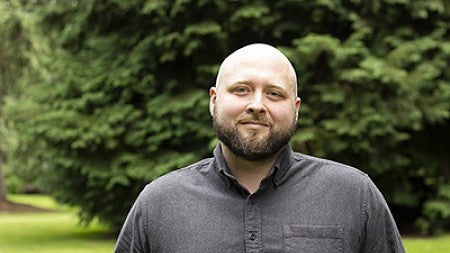
English and Composition Program
nreckten@uoregon.edu | 541-346-3921
Courses: WR 121, WR 122, WR 123, and ENG 612
In my courses you will:
- Make connections to lived experiences and real-world challenges.
- Practice foundational, transferrable skills.
I was invited into the Teaching Academy because:
- I participated in the UO Summer Teaching Institute.
In what ways are you working to make your teaching inclusive?
Inclusivity is a primary focus of my teaching. I use labor-based contract grading to foreground the idea of student agency in writing courses, and transparent assignment design to ensure that students have an easier time understanding not only what I'm asking them to do, but also why I'm asking for them to complete the work and how it will be assessed. We also work hard in my courses to develop questions and paths of inquiry that are related to student interests and relevant to their lives, communities, and objectives.
What do you do in terms of professional engagement with the teaching and learning culture on campus or nationally?
I am a consistent and active participant in TEP workshops focused on active and engaged learning, CMET training and workshops on online teaching and best practices, and I observe the teaching of at least one colleague in my department each academic year. I also participate in an Inclusive Pedagogies Reading and Interest Group with several other faculty members from across campus who teach writing intensive courses. My success as an instructor depends on my consistent and active participation in the teaching community at UO, both within my department and across campus.
In what ways was your teaching in this course research-led—informed by research on how students learn and inflected by UO's research mission?
Whenever possible, I develop and adapt course activities, assignments, and lessons based on research into best practices when it comes to engaged student learning. Learning outcomes are conspicuous in course documents and assignment prompts, class activities are based on what we know is likely to result in active learning, and all of my classes include reflective writing assignments in order to help students develop meta-cognitive skills that extend beyond the writing classroom.
Who or what made you want to be a teacher?
I had an English teacher in my senior year of high school (Mr. Cottingham) who consistently challenged me as a writer and critical thinker to hold myself to a more rigorous standard. He was clever, personable, and committed to his students, which resulted in engaged class sessions (we studied British literature that year), but he graded our written work according to a higher standard than I had been used to at that point. However, he always gave us a chance to revise our work if we didn't like the grade we received (and I never did on the first try!). Mr. Cottingham impacted my development as a student and ultimately as a teacher in many ways, but his most enduring lesson is that strong, effective writing is always an iterative process. I've always carried what I've learned in his class with me and he still informs my values as a teacher and a colleague to this day.
